06 Dec 17 | Bahrain, Bahrain Statements, Campaigns -- Featured, Statements
[vc_row][vc_column][vc_single_image image=”95198″ img_size=”full” add_caption=”yes” alignment=”center”][vc_column_text]The 19th hearing of the leading Bahraini human rights defender Nabeel Rajab was unexpectedly held earlier than the court had originally ruled.
On 3 December, one of the lawyers was informally told by the court that the 2012 Index on Censorship Freedom of Expression Award-winning Rajab’s hearing would take place on 5 December – almost 4 weeks earlier than the agreed date. The court claimed that this was because a key witness, the man who initially arrested Rajab and confiscated his electronic devices, would be travelling on 31 December and unable to attend the hearing.
The case is related to comments on Rajab’s Twitter account about the Saudi-led coalition airstrikes in Yemen, and further comments exposing the torture in Bahrain’s notorious Jau prison. If convicted, Rajab will be sentenced to 15 years imprisonment. He is already serving a two-year sentence for conducting TV interviews.
Despite the protests of Rajab’s lawyers, who wrote to the court on 4 December to ask that the arguments instead be heard on 31 December, the hearing went ahead on Tuesday 5 December. However, the hearing was adjourned until 7 December for the defence to be given further preparation time to prepare the questions and interview Nabeel. Rajab was not present at the hearing due to an ongoing illness.
Despite the Public Prosecution’s failure to provide any incriminating evidence against Rajab, the court continues to chase evidence against him. In November, the prosecution requested to call on the officer who confiscated Rajab’s electronic devices to be examined in court. This request was granted and the trial was adjourned to 31 December. The sudden rearrangement of the trial has not given Rajab’s legal team adequate time to prepare, and violates Rajab’s right to a fair trial.
Sayed Ahmed Alwadaei, director of advocacy at the Bahrain Institute for Rights and Democracy, said: “The rescheduling of Nabeel’s trial for a significantly earlier date is especially worrying, since it suggests that he may be sentenced soon. It is probable that the government of Bahrain will use the distraction of the Christmas period to bury further news of Nabeel’s fate. The continued, unethical support of the UK and the US to Bahrain fosters a culture of impunity.”
Joy Hyvarinen, head of advocacy at Index on Censorship, said: “The moving of the hearing without due notice to Nabeel and his legal team violates his right to a fair trial and international norms for justice.”
In September 2017, a new set of charges was brought against Rajab related to social media posts. The posts were allegedly made in January 2017, when Rajab was already in detention and without internet access. Rajab also faces a fourth set of charges relating to a letter he penned to the New York Times in September 2016. In July 2017 he was sentenced to two years in prison for “spreading false news”; An appeal court upheld his sentence last month.
Rajab was transferred from the Manama Fort hospital to Jau Prison on 25 October 2017. On arrival he was immediately mistreated, subjected to a humiliating physical search, and shaved against his will. All of his personal effects, including books, clothes, toiletries and his shaving set, were confiscated. He is now kept with another 5 prisoners in a very small cell of no more than 3×3 meters.
Rajab is being continuously deprived of his basic rights in Jau Prison. He is denied any books, a specially-designed pillow that he requires for medical reasons, and the cotton clothing his family members gave to him. The clothing is particularly important, given that Nabeel is allergic to the synthetic clothes provided by Jau Prison.
Rajab also complains of a poor, insufficient diet; he is not allowed to visit the prison canteen to buy snacks and is allowed out of his cell for no more than one hour each day. A formal complaint to the Ombudsman has already been made about his treatment, but with no positive results so far.
Rajab, President of the Bahrain Centre for Human Rights, was arrested on 13 June 2016 and has been detained ever since. He was held largely in solitary confinement in the first nine months of his detention, violating the UN Standard Minimum Rules for Non-Custodial Measures (Tokyo Rules) which state: “pre-trial detention shall be used as a means of last resort in criminal proceedings, with due regard for the investigation of the alleged offence and for the protection of society and the victim.”
In early April 2017, Rajab was admitted to the Bahrain Defence Force hospital for a necessary surgery. He was transferred back to police custody just a day later, before he had fully recovered from his operation. As a result, his health deteriorated significantly; from there he was transferred to the Ministry of Interior Clinic (Al-Qalaa), where he remains to date. Between April and August 2017, Rajab was unable to attend court, leading numerous hearings to be held in his absence. Rajab was transferred back to Jau Prison in October.
The UN Committee Against Torture has called for Rajab’s release.
The UK Foreign Office stated: “We continue to closely monitor the case of Nabeel Rajab and have frequently raised it with the Bahraini Government at the highest levels. The UK Government continues to emphasise the need to respect the rights of all citizens, including freedom of expression.”
In the US, the Trump administration this year removed Obama-era human rights conditions on arms sales, one of which was the unconditional release of Rajab. In November, President Trump announced the advancement of $9 billion in commercial deals with the government of Bahrain, including finalizing the purchase of several American F16 jets.
[/vc_column_text][/vc_column][/vc_row][vc_row][vc_column][vc_basic_grid post_type=”post” max_items=”12″ style=”load-more” items_per_page=”4″ element_width=”6″ grid_id=”vc_gid:1512551787343-26858886-5501-5″ taxonomies=”3368″][/vc_column][/vc_row]
06 Dec 17 | Volume 46.04 Winter 2017
[vc_row][vc_column][vc_custom_heading text=”With contributions from Ariel Dorfman, Robert McCrum, Micah White and Anuradha Roy, as well as interviews with Richard Ratcliffe, Emmanuel Laurentin, Floyd Abrams and Buscarita Roa”][/vc_column][/vc_row][vc_row][vc_column][vc_column_text]
In homage to the 50th anniversary of 1968, the year the world took to the streets, the winter issue of Index on Censorship magazine looks at all aspects related to protest.
We explore the most noteworthy and effective protests of the past, as journalist and author Robert McCrum returns to Prague; we cast light on the most interesting and effective protests now, from India and South Korea through to South Africa and Hungary, via Argentina and its protesting grandmothers; we look at why protest still matters, including an interview with Richard Ratcliffe, husband of imprisoned mother Nazanin Zaghari-Ratcliffe; and finally we look to the future of protest in an article from Occupy co-founder Micah White.
[/vc_column_text][/vc_column][/vc_row][vc_row][vc_column][vc_single_image image=”96747″ img_size=”full”][/vc_column][/vc_row][vc_row][vc_column][vc_column_text]
In some of pieces we see how the spirit of ’68 directly lives on. In France, for example, leading journalist historian Emmanuel Laurentin tells Sally Gimson that the young people protesting in ‘68 have been very influential in France since, and that the country holds its revolutionary past dear.
But it’s not all positive. We reveal new research that shows an increase in threats against journalists covering protests, as well as looking at how cities across England are selling off land to private owners and in so doing compromising our basic democratic rights. Articles from Turkey, Egypt and Latin America highlight the increasing dangers attached to going out into the streets and who is still taking the risk.
Outside the special report, the lawyer who represented the New York Times in the Pentagon Papers talks about the constitutional crisis affecting the USA today. And on a different note, we look at how musicians are being silenced in Catalan, whilst elsewhere people are being made to sing, the national anthem in this instance.
Finally, do not miss our exclusive short story from award-winning writer Ariel Dorfman. It features Shakespeare, Cervantes and spies, the perfect trio for a work of fiction.
[/vc_column_text][/vc_column][vc_column][/vc_column][/vc_row][vc_row][vc_column][vc_custom_heading text=”Special report: What price protest?”][vc_column_text]
Toxic environment, by Kaya Genç: Five years after Gezi Park, people in Turkey have given up on public space and retreated online
Is protesting pointless? by Micah White: One of the co-founders of Occupy proposes a novel way for protest to remain relevant
Square bashing, by Sally Gimson: English cities are giving away basic democratic rights when they sell off management of central streets, our report shows
Demonstration by design, by Danyaal Yasin: Banners are so 1968 as these new protests show the 2017 look is extremely creative
Stripsearch, by Martin Rowson: The world’s dictators have taken to the streets. What do they really, really want?
Meeting the oldest protesters in town, by Lucia He: An interview with one of Argentina’s famous grandmothers about decades of campaigning
Under a cloud, by Duncan Tucker: Tear gas, violence and new laws are all being used to frighten Latin American protesters into giving up
Green light from the Blue House? by Steven Borowiec: He came to power arguing he could protect protest, but is South Korea’s new president doing what he promised?
Return to the streets, by Raymond Joseph: Anti-apartheid demonstrators thought they had hung up their placards, but now they are back on protests
China’s middle class rebellion, by Robert Foyle Hunwick: There are cracks in the Chinese dream, and now the middle class is getting angry
“I see you”, by Rachael Jolley: The husband of imprisoned mother Nazanin Zaghari-Ratcliffe talks to Index about why protest matters
Having the last laugh, by Csabi Tasi and Jemimah Steinfeld: Meet the party injecting humour into Hungarian politics and challenging the status quo
1968 and all that, by Sally Gimson: One of France’s leading journalistic historians discusses the new style of French protest
Wrongs threatening our rights, by Raj Chadda: A lawyer advises on increasing conditions being imposed on protests by UK police
Women walk out, by Shilpa Phadke and Anuradha Roy: Tired of being harassed and treated as second class citizens, Indian women are taking to the streets
It’s Spring again, by Robert McCrum: Fifty years after the Prague Spring, the author and journalist visits to ask whether it is still remembered. Also Pavel Theiner reflects on 1968
Mapping attacks, by Ryan McChrystal: Index reveals new research showing a rise in the dangers journalists face covering protests in Europe
“There was no outrage”, by Wael Eskandar: An Egyptian journalist on witnessing the dangers – and death – of protest in his country
[/vc_column_text][/vc_column][/vc_row][vc_row][vc_column][vc_custom_heading text=”Column”][vc_column_text]
Global view, by Jodie Ginsberg: We need to champion free speech for all or risk the far-right controlling the conversation
[/vc_column_text][/vc_column][/vc_row][vc_row][vc_column][vc_custom_heading text=”In focus”][vc_column_text]
They can’t stop the music, by Silvia Nortes and Dominic Hinde: Artistic freedom in the run-up to the referendums in Scotland and Catalonia are compared. Catalonia loses
Book fairs and their freedoms, by Dominic Hinde, Ola Larsmo, Tobias Voss and Jean-Paul Marthoz: Controversies at Frankfurt and Gothenburg book fairs are leading to arguments about the freedom to speak and appear at these events
First Amendment comes under fire, by Jan Fox: An interview with the lawyer who represented the New York Times in the Pentagon Papers case on the constitutional crisis hitting the USA today
Making the cut, by Wana Udobang: One of Nollywood’s leading directors on what it’s like working in the second biggest film industry in the world
[/vc_column_text][/vc_column][/vc_row][vc_row][vc_column][vc_custom_heading text=”Culture”][vc_column_text]
Spying for Shakespeare: An interview by Rachael Jolley with playwright Ariel Dorfman and introduction to his new short story, Saving Will and Miguel, with themes of Shakespeare, Cervantes and spies. This story for Index from the award-winning writer has it all
[/vc_column_text][/vc_column][/vc_row][vc_row][vc_column][vc_custom_heading text=”Column”][vc_column_text]
Index around the world, by Danyaal Yasin: We’ve live broadcast an event and become UK partner on Banned Books Week, just two recent Index highlights
[/vc_column_text][/vc_column][/vc_row][vc_row][vc_column][vc_custom_heading text=”Endnote”][vc_column_text]
Blurred lines, by Jemimah Steinfeld: National anthems are back in fashion. Why and where are people being forced to sing against their will?
[/vc_column_text][/vc_column][/vc_row][vc_row content_placement=”top”][vc_column width=”1/3″][vc_custom_heading text=”What price protest?” font_container=”tag:p|font_size:24|text_align:left” link=”url:https%3A%2F%2Fwww.indexoncensorship.org%2Fnewsite02may%2F2017%2F12%2Fwhat-price-protest%2F%20|||”][vc_column_text]Through a range of in-depth reporting, interviews and illustrations, the summer 2017 issue of Index on Censorship magazine explores the 50th anniversary of 1968, the year the world took to the streets, to look at all aspects related to protest.
With: Micah White, Robert McCrum, Ariel Dorfman, Anuradha Roy and more.[/vc_column_text][/vc_column][vc_column width=”1/3″][vc_single_image image=”96747″ img_size=”medium” alignment=”center” onclick=”custom_link” link=”https://www.indexoncensorship.org/newsite02may/2017/12/what-price-protest/”][/vc_column][vc_column width=”1/3″ css=”.vc_custom_1481888488328{padding-bottom: 50px !important;}”][vc_custom_heading text=”Subscribe” font_container=”tag:p|font_size:24|text_align:left” link=”url:https%3A%2F%2Fwww.indexoncensorship.org%2Fnewsite02may%2Fsubscribe%2F|||”][vc_column_text]In print, online. In your mailbox, on your iPad.
Subscription options from £18 or just £1.49 in the App Store for a digital issue.
Every subscriber helps support Index on Censorship’s projects around the world.
 SUBSCRIBE NOW[/vc_column_text][/vc_column][/vc_row]
SUBSCRIBE NOW[/vc_column_text][/vc_column][/vc_row]
05 Dec 17 | Magazine, Volume 46.04 Winter 2017
Author
Ariel Dorfman is a playwright, author, essayist and human rights activist. His play Death and the Maiden won the 1992 Lawrence Olivier award and was adapted into a film.
Author
Anuradha Roy is an award-winning novelist, journalist and editor. She has written three novels, including Sleeping on Jupiter, which was long-listed for the Man Booker Prize.
Activist
Micah White is an activist, journalist and academic, who co-created Occupy Wall Street. He is author of The End of Protest: A New Playbook for Revolution, which was published in 2016.
05 Dec 17 | Europe and Central Asia, Mapping Media Freedom, Media Freedom, media freedom featured, Montenegro, News and features
[vc_row][vc_column][vc_single_image image=”96761″ img_size=”full” alignment=”center”][vc_column_text]This article was originally published by Osservatorio Balcani e Caucaso.
Read in Italian.
Jovo Martinović is a freelance investigative journalist in Montenegro, who has worked for a number of international outlets — National Public Radio, BBC, VICE, CBS, Canal Plus, The Economist, TIME, Global Post, BIRN — and is known for his reports on organised crime in Europe and war criminals in the Balkans. His investigations brought him in close contact with persons involved in drug-trafficking as well as members of the Pink Panthers, an international network of jewellery thieves.
In October 2015, he was arrested after being charged with drug trafficking and participation in a criminal organisation. The prosecution by the Montenegrin state – as well as the long, unjustified pre-trial detention – was highly criticised by international media freedom and human rights organisations. Martinović proclaimed his innocence and – as a well-known, respected investigative journalist – could convincingly state that the contacts were part of his investigation.
Martinović was released at the beginning of 2017 after 14 months in prison, but is still on trial, facing up to ten years in prison. Francesco Martino, a correspondent for Osservatorio Balcani e Caucaso, met him in Pristina, during a conference organised by Le Courrier des Balkans.
Do you see your case as unique, or as part of a general strategy to undermine freedom of the press in Montenegro?
In Montenegro, in these last years, several cases were registered of physical attacks against journalists, and in 2013 the premises of the leading independent newspaper Vijesti were bombed. So, yes, the media and journalists have been under pressure in Montenegro. My personal case was somehow different, probably because I have always worked for the Western media. The approach taken against me was definitely unique: no other journalist in Montenegro has spent fourteen and a half months in prison. Cases like mine have been registered in countries like Russia, Turkey, and Venezuela, where last year investigative journalist Braulio Jatar was accused of money laundering and imprisoned after appearing as an opponent of Venezuelan president Nicolás Maduro.
In the past, were you ever “warned” to stop your investigations by representatives of the political power?
I was warned – to put it that way – several times in the past, when I worked in some investigations that were not particularly well-received, to say so. Sometimes, I was even suspected for reports which appeared in the foreign media that I had nothing to do with.
How were you treated during your long imprisonment?
I was treated fairly during my stay in prison. While filming a documentary film on the main defendant in my case, Dusko Martinović, I had been several times in prison to interview him, so they already knew me there. I enjoyed a fair treatment, and I didn’t receive any pressure from the prison staff while being detained.
How do you explain your incarceration? Which are the reasons for such a long time behind bars?
When I was arrested, I was working on a documentary film for the French channel Canal Plus about smuggling of weapons from the Balkans – Albania and Bosnia and Herzegovina in particular – into France, weapons that eventually ended up in the hands of terrorist groups. Back then, I was working on the Bosnian case and filming in Serbia, so our investigation wasn’t linked to Montenegro at all. I find it difficult to link it with my incarceration unless we’re speaking of pure communist paranoia on the part of someone in power. I rather believe that they used the documentary as an opportunity for pay-back for my non-compliance and “insubordination” in earlier cases.
You have always worked for international media rather than for local ones. Do you think this puts you in a more delicate position?
Yes, sure. Balkan governments are much more scared and worried about what big international media report about them than the local ones. So, working for international media puts you under a stronger pressure, because if governments or the security structures aren’t happy about the way a certain matter has been reported, the easiest way to retaliate is to put the blame on the local stringer.
What was the reaction of journalist’s organisations and the Montenegrin media to your arrest? Did you receive tangible solidarity?
Initially, local media picked the news from international organisations that wrote to the Montenegrin government on my behalf. In the beginning, the reaction was quite humble, maybe because I wasn’t really perceived as part of the Montenegro media community since, as I already stressed, I never worked for the local media. But when my incarceration was prolonged, Montenegrin independent media started to focus on my case and were very supportive. On the other hand, though, the state-controlled media basically ignored my story.
Do you think journalists and media in Montenegro are eager to support each other in defending freedom of speech in the country?
Montenegro is a small country with a small media market, so petty rivalries among journalists are quite common. Nevertheless, when it comes to serious matters like protecting media freedom, I think solidarity and mutual support prevail.
Is there any real room for investigative journalism in Montenegro? Are there concrete opportunities to denounce corruption, links between political power and organised crime, and effective channels to reach the public?
Sure, freedom of expression does exist and in these past years, some local media have done an extremely good job. There have been several good stories, scoops, which haven’t produced any big change in society yet. Of course, as in many other countries in transition, opportunities for good journalism in Montenegro are accompanied by risks and challenges. What’s worse, though, is that good investigations usually have no impact, even if they’re substantiated by facts and documents. In the Balkans, and particularly in such a small country as Montenegro, you don’t have the same public response to news criticising the government as in Western Europe. I think this is partly explained by a weaker democratic tradition.
Montenegro is currently an EU candidate state: do you think the European monitoring linked with accession negotiations is helping to improve media freedom in the country?
It’s difficult to give a clear-cut answer, but I believe the EU is generally playing a positive role. Endorsing a Western system of values in the framework of the EU accession process is relatively easy, while it’s way more challenging to actually implement those values, transforming Balkan countries into viable realms of rule-of-law.
This publication has been produced within the project European Centre for Press and Media Freedom, co-funded by the European Commission. The contents of this publication are the sole responsibility of Osservatorio Balcani e Caucaso and its partners and can in no way be taken to reflect the views of the European Union. The project’s page[/vc_column_text][/vc_column][/vc_row][vc_row][vc_column][vc_basic_grid post_type=”post” max_items=”12″ style=”load-more” items_per_page=”4″ element_width=”6″ grid_id=”vc_gid:1512410060523-0e52f5ac-262f-7″ taxonomies=”9043, 4612″][/vc_column][/vc_row]
04 Dec 17 | About Index, History, Magazine, News and features
[vc_row][vc_column][vc_custom_heading text=”The first editor of Index on Censorship magazine reflects on the driving forces behind its founding in 1972″ google_fonts=”font_family:Libre%20Baskerville%3Aregular%2Citalic%2C700|font_style:400%20italic%3A400%3Aitalic”][vc_column_text][/vc_column_text][vc_row_inner][vc_column_inner][vc_column_text]A version of this article first appeared in Index on Censorship magazine in December 1981. [/vc_column_text][/vc_column_inner][/vc_row_inner][/vc_column][/vc_row][vc_row][vc_column][vc_column_text]
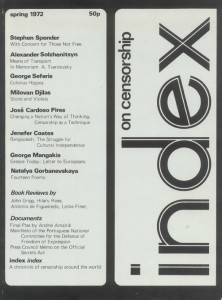
The first issue of Index on Censorship Magazine, 1972
Starting a magazine is as haphazard and uncertain a business as starting a book-who knows what combination of external events and subjective ideas has triggered the mind to move in a particular direction? And who knows, when starting, whether the thing will work or not and what relation the finished object will bear to one’s initial concept? That, at least, was my experience with Index, which seemed almost to invent itself at the time and was certainly not ‘planned’ in any rational way. Yet looking back, it is easy enough to trace the various influences that brought it into existence.
It all began in January 1968 when Pavel Litvinov, grandson of the former Soviet Foreign Minister, Maxim Litvinov, and his Englis wife, Ivy, and Larisa Bogoraz, the former wife of the writer, Yuli Daniel, addressed an appeal to world public opinion to condemn the rigged trial of two young writers and their typists on charges of ‘anti-Soviet agitation and propaganda’ (one of the writers, Alexander Ginzburg, was released from the camps in 1979 and now lives in Paris: the other, Yuri Galanskov, died in a camp in 1972). The appeal was published in The Times on 13 January 1968 and evoked an answering telegram of support and sympathy from sixteen English and American luminaries, including W H Auden, A J Ayer, Maurice Bowra, Julian Huxley, Mary McCarthy, Bertrand Russell and Igor Stravinsky.
The telegram had been organised and dispatched by Stephen Spender and was answered, after taking eight months to reach its addressees, by a further letter from Litvinov, who said in part: ‘You write that you are ready to help us “by any method open to you”. We immediately accepted this not as a purely rhetorical phrase, but as a genuine wish to help….’ And went on to indicate the kind oh help he had in mind:
My friends and I think it would be very important to create an international committee or council that would make it its purpose to support the democratic movement in the USSR. This committee could be composed of universally respected progressive writers, scholars, artists and public personalities from England, the United States, France, Germany and other western countries, and also from Latin America, Asia, Africa and, in the future, even from Eastern Europe…. Of course, this committee should not have an anti-communist or anti-Soviet character. It would even be good if it contained people persecuted in their own countries for pro-communist or independent views…. The point is not that this or that ideology is not correct, but that it must not use force to demonstrate its correctness.
Stephen Spender took up this idea first with Stuart Hampshire (the Oxford philosopher), a co-signatory of the telegram, and with David Astor (then editor of the Observer), who joined them in setting up a committee along the lines suggested by Litvinov (among its other members were Louis Blom-Cooper, Edward Crankshaw, Lord Gardiner, Elizabeth Longford and Sir Roland Penrose, and its patrons included Dame Peggy Ashcroft, Sir Peter Medawar, Henry Moore, Iris Murdoch, Sir Michael Tippett and Angus Wilson). It was not, admittedly, as international as Litvinov had suggested, but it was thought more practical to begin locally, so to speak, and to see whether or not there was something in it before expanding further. Nevertheless, the chosen name for the new organisation, Writers and Scholars International, was an earnest of its intentions, while its deliberate echo of Amnesty International (then relatively modest in size) indicated a feeling that not only literature but also human rights would be at issue.
By now it was 1971 and in the spring of that year the committee advertised for a director, held a series of interviews and offered me the job. There was no programme, other than Litvinov’s letter, there were no premises or staff, and there was very little money, but there were high hopes and enthusiasm.
It was at this point that some of the subjective factors I mentioned earlier began to come into play. Litvinov’s letter had indicated two possible forms of action. One was the launching of protests to ‘support and defend’ people who were being persecuted for their civic and literary activities in the USSR. The other was to ‘provide information to world public opinion’ about this state of affairs and to operate with ‘some sort of publishing house’. The temptation was to go for the first, particularly since Amnesty was setting such a powerful example, but precisely because Amnesty (and the International PEN Club) were doing such a good job already, I felt that the second option would be the more original and interesting to try. Furthermore, I knew that two of our most active members, Stephen Spender and Stuart Hampshire, on the rebound from Encounter after disclosures of CIA funding, had attempted unsuccessfully to start a new magazine, and I felt that they would support something in the publishing line. And finally, my own interests lay mainly in that direction. My experience had been in teaching, writing, translating and broadcasting. Psychologically I was too much of a shrinking violet to enjoy kicking up a fuss in public. I preferred argument and debate to categorical statements and protest, the printed page to the soapbox; I needed to know much more about censorship and human rights before having strong views of my own.
At that stage I was thinking in terms of trying to start some sort of alternative or ‘underground’ (as the term was misleadingly used) newspaper – Oz and the International Times were setting the pace were setting the pace in those days, with Time Out just in its infancy. But a series of happy accidents began to put other sorts of material into my hands. I had been working recently on Solzhenitzin and suddenly acquired a tape-recording with some unpublished poems in prose on it. On a visit to Yugoslavia, I called on Milovan Djilas and was unexpectedly offered some of his short stories. A Portuguese writer living in London, Jose Cardoso Pires, had just written a first-rate essay on censorship that fell into my hands. My friend, Daniel Weissbort, editor of Modern Poetry in Translation, was working on some fine lyrical poems by the Soviet poet, Natalya Gorbanevskaya, then in a mental hospital. And above all I stumbled across the magnificent ‘Letter to Europeans’ by the Greek law professor, George Mangakis, written in one of the colonels’ jails (which I still consider to be one of the best things I have ever published). It was clear that these things wouldn’t fit very easily into an Oz or International Times, yet it was even clearer that they reflected my true tastes and were the kind of writing, for better or worse, that aroused my enthusiasm. At the same time I discovered that from the point of view of production and editorial expenses, it would be far easier to produce a magazine appearing at infrequent intervals, albeit a fat one, than to produce even the same amount of material in weekly or fortnightly instalments in the form of a newspaper. And I also discovered, as Anthony Howard put it in an article about the New Statesman, that whereas opinions come cheap, facts come dear, and facts were essential in an explosive field like human rights. Somewhat thankfully, therefore, my one assistant and I settled for a quarterly magazine.
There is no point, I think, in detailing our sometimes farcical discussions of a possible title. We settled on Index (my suggestion) for what seemed like several good reasons: it was short; it recalled the Catholic Index Librorum Prohibitorum; it was to be an index of violations of intellectual freedom; and lastly, so help me an index finger pointing accusingly at the guilty oppressors – we even introduced a graphic of a pointing finger into our early issues. Alas, when we printed our first covers bearing the bold name of Index (vertically to attract attention nobody got the point (pun unintended). Panicking, we hastily added the ‘on censorship’ as a subtitle – Censorship had been the title of an earlier magazine, by then defunct – and this it has remained ever since, nagging me with its ungrammatically (index of censorship, surely) and a standing apology for the opacity of its title. I have since come to the conclusion that it is a thoroughly bad title – Americans, in particular, invariably associate it with the cost of living and librarians with, well indexes. But it is too late to change now.
Our first issue duly appeared in May 1972, with a programmatic article by Stephen Spender (printed also in the TLS) and some cautious ‘Notes’ by myself. Stephen summarised some of the events leading up to the foundation of the magazine (not naming Litvinov, who was then in exile in Siberia) and took freedom and tyranny as his theme:
Obviously there is a risk of a magazine of this kind becoming a bulletin of frustration. However, the material by writers which is censored in Eastern Europe, Greece, South Africa and other countries is among the most exciting that is being written today. Moreover, the question of censorship has become a matter of impassioned debate; and it is one which does not only concern totalitarian societies.
I contented myself with explaining why there would be no formal programme and emphasised that we would be feeling our way step by step. ‘We are naturally of the opinion that a definite need {for us} exists….But only time can tell whether the need is temporary or permanent—and whether or not we shall be capable of satisfying it. Meanwhile our aims and intentions are best judged…by our contents, rather than by editorials.’
[/vc_column_text][/vc_column][/vc_row][vc_row][vc_column width=”1/4″][vc_icon icon_fontawesome=”fa fa-quote-left” color=”custom” align=”right” custom_color=”#dd3333″][/vc_column][vc_column width=”3/4″][vc_custom_heading text=”My friends and I think it would be very important to create an international committee or council that would make it its purpose to support the democratic movement in the USSR.” google_fonts=”font_family:Libre%20Baskerville%3Aregular%2Citalic%2C700|font_style:400%20italic%3A400%3Aitalic”][/vc_column][/vc_row][vc_row][vc_column][vc_column_text]
In the course of the next few years it became clear that the need for such a magazine was, if anything, greater than I had foreseen. The censorship, banning and exile of writers and journalists (not to speak of imprisonment, torture and murder) had become commonplace, and it seemed at times that if we hadn’t started Index, someone else would have, or at least something like it. And once the demand for censored literature and information about censorship was made explicit, the supply turned out to be copious and inexhaustible.
One result of being inundated with so much material was that I quickly learned the geography of censorship. Of course, in the years since Index began, there have been many changes. Greece, Spain, and Portugal are no longer the dictatorships they were then. There have been major upheavals in Poland, Turkey, Iran, the Lebanon, Pakistan, Nigeria, Ghana and Zimbabwe. Vietnam, Cambodia and Afghanistan have been silenced, whereas Chinese writers have begun to find their voices again. In Latin America, Brazil has attained a measure of freedom, but the southern cone countries of Chile, Argentina, Uruguay and Bolivia have improved only marginally and Central America has been plunged into bloodshed and violence.
Despite the changes, however, it became possible to discern enduring patterns. The Soviet empire, for instance, continued to maltreat its writers throughout the period of my editorship. Not only was the censorship there highly organised and rigidly enforced, but writers were arrested, tried and sent to jail or labour camps with monotonous regularity. At the same time, many of the better ones, starting with Solzhenitsyn, were forced or pushed into exile, so that the roll-call of Russian writers outside the Soviet Union (Solzhenitsyn, Sinyavksy, Brodsky, Zinoviev, Maximov, Voinovich, Aksyonov, to name but a few) now more than rivals, in talent and achievement, those left at home. Moreover, a whole array of literary magazines, newspapers and publishing houses has come into existence abroad to serve them and their readers.
In another main black spot, Latin America, the censorship tended to be somewhat looser and ill-defined, though backed by a campaign of physical violence and terror that had no parallel anywhere else. Perhaps the worst were Argentina and Uruguay, where dozens of writers were arrested and ill-treated or simply disappeared without trace. Chile, despite its notoriety, had a marginally better record with writers, as did Brazil, though the latter had been very bad during the early years of Index.
In other parts of the world, the picture naturally varies. In Africa, dissident writers are often helped by being part of an Anglophone or Francophone culture. Thus Wole Soyinka was able to leave Nigeria for England, Kofi Awoonor to go from Ghana to the United States (though both were temporarily jailed on their return), and French-speaking Camara Laye to move from Guinea to neighbouring Senegal. But the situation can be more complicated when African writers turn to the vernacular. Ngugi wa Thiong’o, who has written some impressive novels in English, was jailed in Kenya only after he had written and produced a play in his native Gikuyu.
In Asia the options also tend to be restricted. A mainland Chinese writer might take refuge in Hong Kong or Taiwan, but where is a Taiwanese to go? In Vietnam, Cambodia, Laos, the possibilities for exile are strictly limited, though many have gone to the former colonising country, France, which they still regard as a spiritual home, and others to the USA. Similarly, Indonesian writers still tend to turn to Holland, Malaysians to Britain, and Filipinos to the USA.
In documenting these changes and movements, Index was able to play its small part. It was one of the very first magazines to denounce the Shah’s Iran, publishing as early as 1974 an article by Sadeq Qotbzadeh, later to become Foreign Minister in Ayatollah Khomeini’s first administration. In 1976 we publicised the case of the tortured Iranian poet, Reza Baraheni, whose testimony subsequently appeared on the op-ed page of the New York Times. (Reza Baraheni was arrested, together with many other writers, by the Khomeini regime on 19 October 1981.) One year later, Index became the publisher of the unofficial and banned Polish journal, Zapis, mouthpiece of the writers and intellectuals who paved the way for the present liberalisation in Poland. And not long after that it started putting out the Czech unofficial journal, Spektrum, with a similar intellectual programme. We also published the distinguished Nicaraguan poet, Ernesto Cardenal, before he became Minister of Education in the revolutionary government, and the South Korean poet, Kim Chi-ha, before he became an international cause célèbre.
[/vc_column_text][/vc_column][/vc_row][vc_row][vc_column width=”1/4″][vc_icon icon_fontawesome=”fa fa-quote-left” color=”custom” align=”right” custom_color=”#dd3333″][/vc_column][vc_column width=”3/4″][vc_custom_heading text=”Looking back, not only over the thirty years since Index was started, but much further, over the history of our civilisation, one cannot help but realise that censorship is by no means a recent phenomenon.” google_fonts=”font_family:Libre%20Baskerville%3Aregular%2Citalic%2C700|font_style:400%20italic%3A400%3Aitalic”][/vc_column][/vc_row][vc_row][vc_column][vc_column_text]
One of the bonuses of doing this type of work has been the contact, and in some cases friendship, established with outstanding writers who have been in trouble: Solzhenitsyn, Djilas, Havel, Baranczak, Soyinka, Galeano, Onetti, and with the many distinguished writers from other parts of the world who have gone out of their way to help: Heinrich Böll, Mario Vargas Llosa, Stephen Spender, Tom Stoppard, Philip Roth—and many other too numerous to mention. There is a kind of global consciousness coming into existence, which Index has helped to foster and which is especially noticeable among writers. Fewer and fewer are prepared to stand aside and remain silent while their fellows are persecuted. If they have taught us nothing else, the Holocaust and the Gulag have rubbed in the fact that silence can also be a crime.
The chief beneficiaries of this new awareness have not been just the celebrated victims mentioned above. There is, after all, an aristocracy of talent that somehow succeeds in jumping all the barriers. More difficult to help, because unassisted by fame, are writers perhaps of the second or third rank, or young writers still on their way up. It is precisely here that Index has been at its best.
Such writers are customarily picked on, since governments dislike the opprobrium that attends the persecution of famous names, yet even this is growing more difficult for them. As the Lithuanian theatre director, Jonas Jurasas, once wrote to me after the publication of his open letter in Index, such publicity ‘deprives the oppressors of free thought of the opportunity of settling accounts with dissenters in secret’ and ‘bears witness to the solidarity of artists throughout the world’.
Looking back, not only over the years since Index was started, but much further, over the history of our civilisation, one cannot help but realise that censorship is by no means a recent phenomenon. On the contrary, literature and censorship have been inseparable pretty well since earliest times. Plato was the first prominent thinker to make out a respectable case for it, recommending that undesirable poets be turned away from the city gates, and we may suppose that the minstrels and minnesingers of yore stood to be driven from the castle if their songs displeased their masters. The examples of Ovid and Dante remind us that another old way of dealing with bad news was exile: if you didn’t wish to stop the poet’s mouth or cover your ears, the simplest solution was to place the source out of hearing. Later came the Inquisition, after which imprisonment, torture and execution became almost an occupational hazard for writers, and it is only in comparatively recent times—since the eighteenth century—that scribblers have fought back and demanded an unconditional right to say what they please. Needless to say, their demands have rarely and in few places been met, but their rebellion has resulted in a new psychological relationship between rulers and ruled.
Index, of course, ranged itself from the very first on the side of the scribblers, seeking at all times to defend their rights and their interests. And I would like to think that its struggles and campaigns have borne some fruit. But this is something that can never be proved or disproved, and perhaps it is as well, for complacency and self-congratulation are the last things required of a journal on human rights. The time when the gates of Plato’s city will be open to all is still a long way off. There are certainly many struggles and defeats still to come—as well, I hope, as occasional victories. When I look at the fragility of Index‘s a financial situation and the tiny resources at its disposal I feel surprised that it has managed to hold out for so long. No one quite expected it when it started. But when I look at the strength and ambitiousness of the forces ranged against it, I am more than ever convinced that we were right to begin Index in the first place, and that the need for it is as strong as ever. The next ten years, I feel, will prove even more eventful than the ten that have gone before.
[/vc_column_text][/vc_column][/vc_row][vc_row][vc_column][vc_column_text]
Michael Scammell was the editor of Index on Censorship from 1972 to August 1980.
[/vc_column_text][/vc_column][/vc_row][vc_row content_placement=”top”][vc_column width=”1/3″][vc_custom_heading text=”Free to air” font_container=”tag:p|font_size:24|text_align:left” link=”url:%20https%3A%2F%2Fwww.indexoncensorship.org%2Fnewsite02may%2F2017%2F09%2Ffree-to-air%2F|||”][vc_column_text]Through a range of in-depth reporting, interviews and illustrations, the autumn 2017 issue of Index on Censorship magazine explores how radio has been reborn and is innovating ways to deliver news in war zones, developing countries and online
With: Ismail Einashe, Peter Bazalgette, Wana Udobang[/vc_column_text][/vc_column][vc_column width=”1/3″][vc_single_image image=”95458″ img_size=”medium” alignment=”center” onclick=”custom_link” link=”https://www.indexoncensorship.org/newsite02may/2017/09/free-to-air/”][/vc_column][vc_column width=”1/3″ css=”.vc_custom_1481888488328{padding-bottom: 50px !important;}”][vc_custom_heading text=”Subscribe” font_container=”tag:p|font_size:24|text_align:left” link=”url:https%3A%2F%2Fwww.indexoncensorship.org%2Fnewsite02may%2Fsubscribe%2F|||”][vc_column_text]In print, online. In your mailbox, on your iPad.
Subscription options from £18 or just £1.49 in the App Store for a digital issue.
Every subscriber helps support Index on Censorship’s projects around the world.
 SUBSCRIBE NOW[/vc_column_text][/vc_column][/vc_row]
SUBSCRIBE NOW[/vc_column_text][/vc_column][/vc_row]
01 Dec 17 | Campaigns -- Featured, Media Freedom, media freedom featured
[vc_row][vc_column][vc_column_text]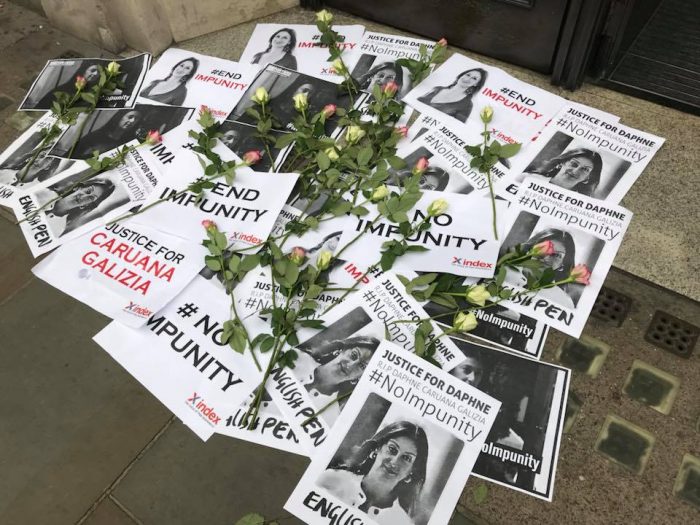
The family of murdered journalist Daphne Caruana Galizia has issued a statement and a letter in response to Maltese minister Michael Farrugia’s publication of their private letter to him. The private letter reminded the minister of his legal responsibilities related to the investigation into the murder of Daphne Caruana Galizia. In the statement, the family says: “We were dismayed to see that the Minister of Home Affairs and National Security, Michael Farrugia, published our letter to him accompanied by a media statement. This was a private letter from the widower and sons of an assassination victim to their country’s minister who is responsible for the police and, ultimately, the assassination investigation.”
Index on Censorship condemns the minister’s actions. “This is a deeply discouraging development, said Joy Hyvarinen, head of advocacy at Index on Censorship. The Maltese authorities should be focusing on investigating the killing of Daphne Caruana Galizia, rather than engaging in a public fight with the grieving family.”
Response by assassination victim’s widower and sons to minister of home affairs and national security Michael Farrugia
“We were dismayed to see that the Minister of Home Affairs and National Security, Michael Farrugia, published our letter to him accompanied by a media statement. This was a private letter from the widower and sons of an assassination victim to their country’s minister who is responsible for the police and, ultimately, the assassination investigation.
“It is inappropriate and irregular that the Maltese government publishes a private letter from citizens to the Minister responsible for their security, more so to send it to every media outlet in the country with an accompanying media statement. And it is inappropriate and irregular for the same Minister Michael Farrugia to ‘Tweet’ that statement and to have the Prime Minister re-Tweet it.
“We have responded in writing to Minister Michael Farrugia’s actions. As the widower and orphaned sons of an assassination victim killed on his watch, as private citizens, we would have preferred to deal privately with the concerns we have raised. As we now cannot be sure Minister Michael Farrugia will respect protocol and dignity and obligations of his office and not release our latest letter to him to the media, we have been constrained to do so ourselves, accompanied by our own statement.”
Family’s letter to Farrugia
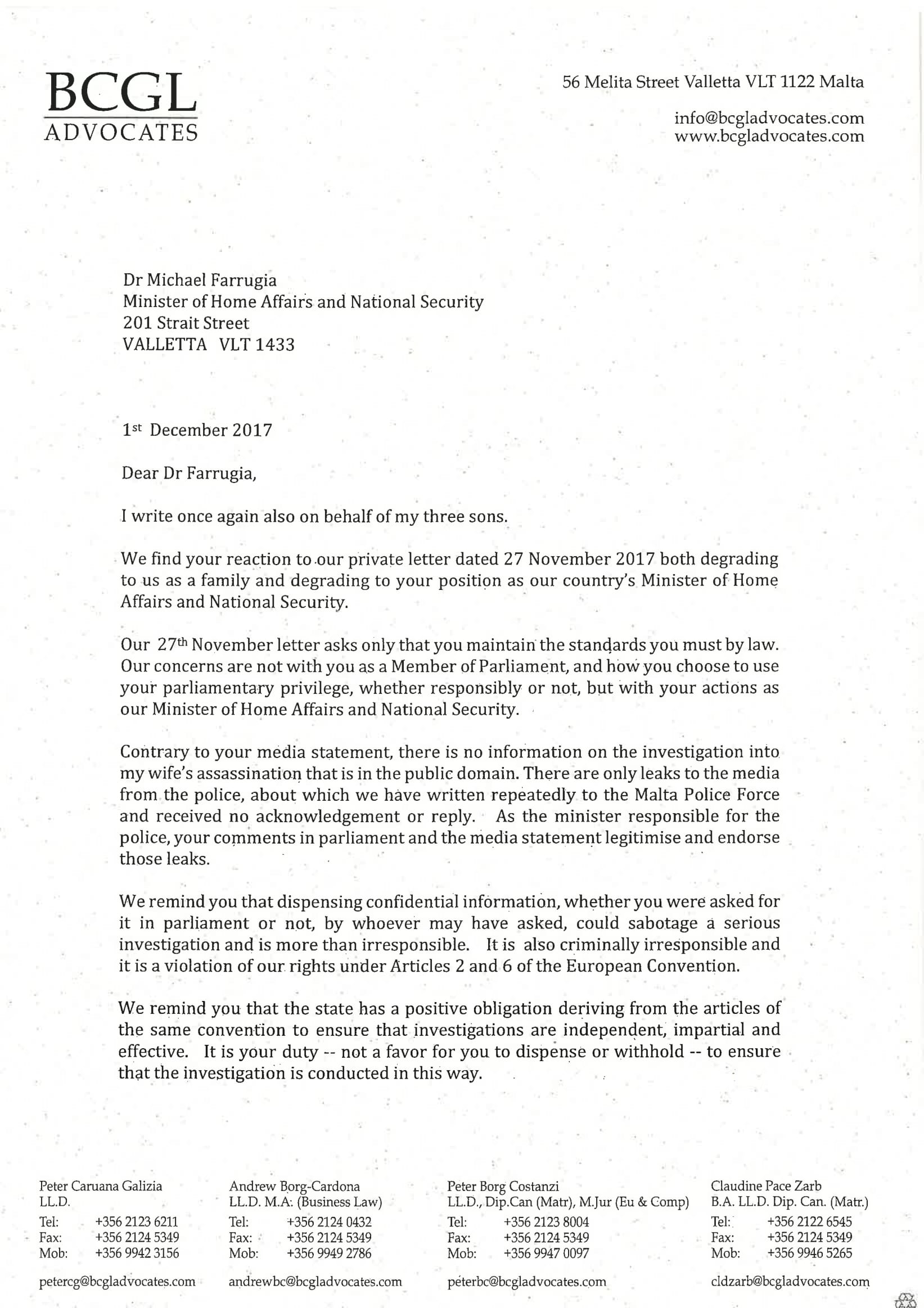
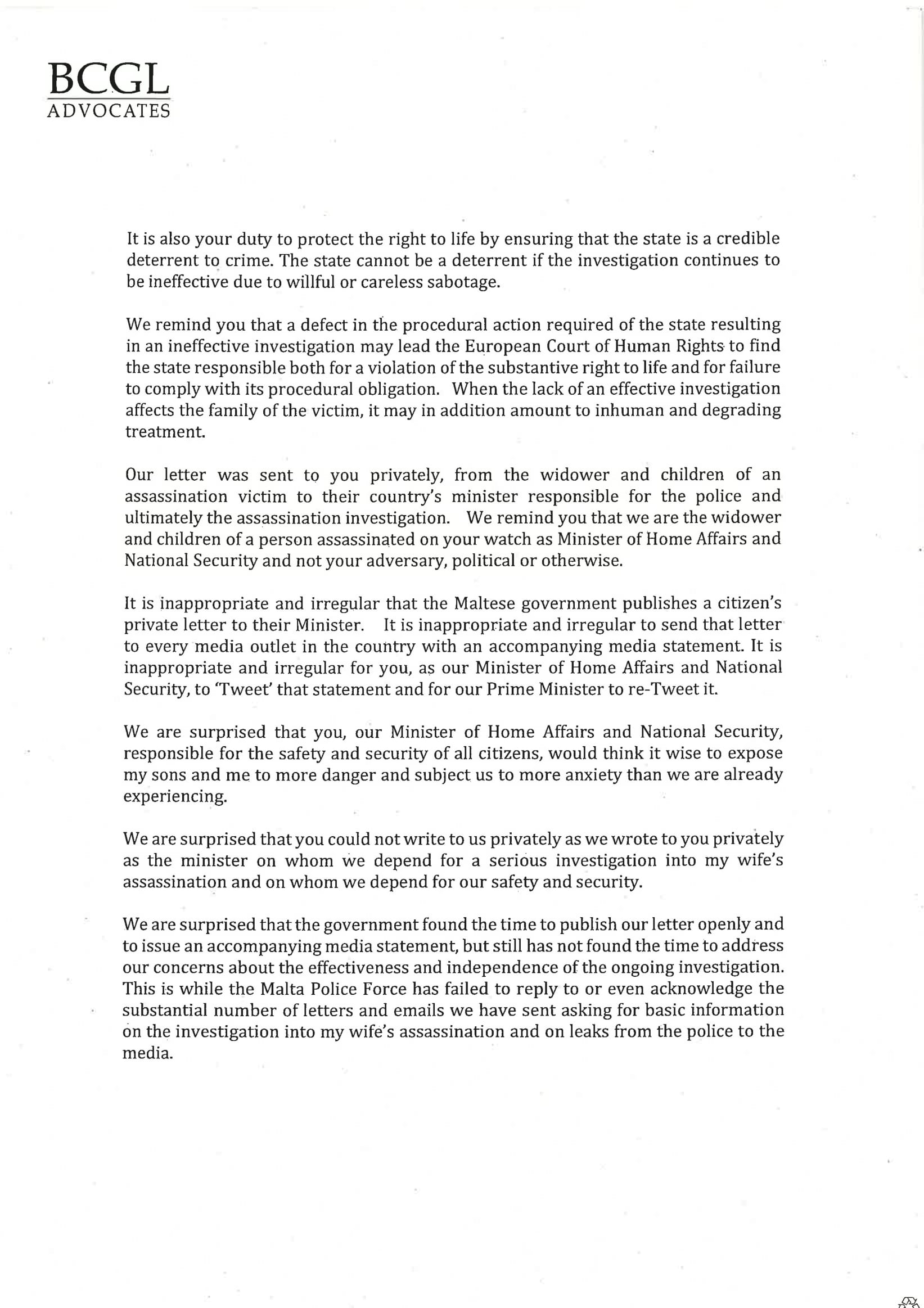
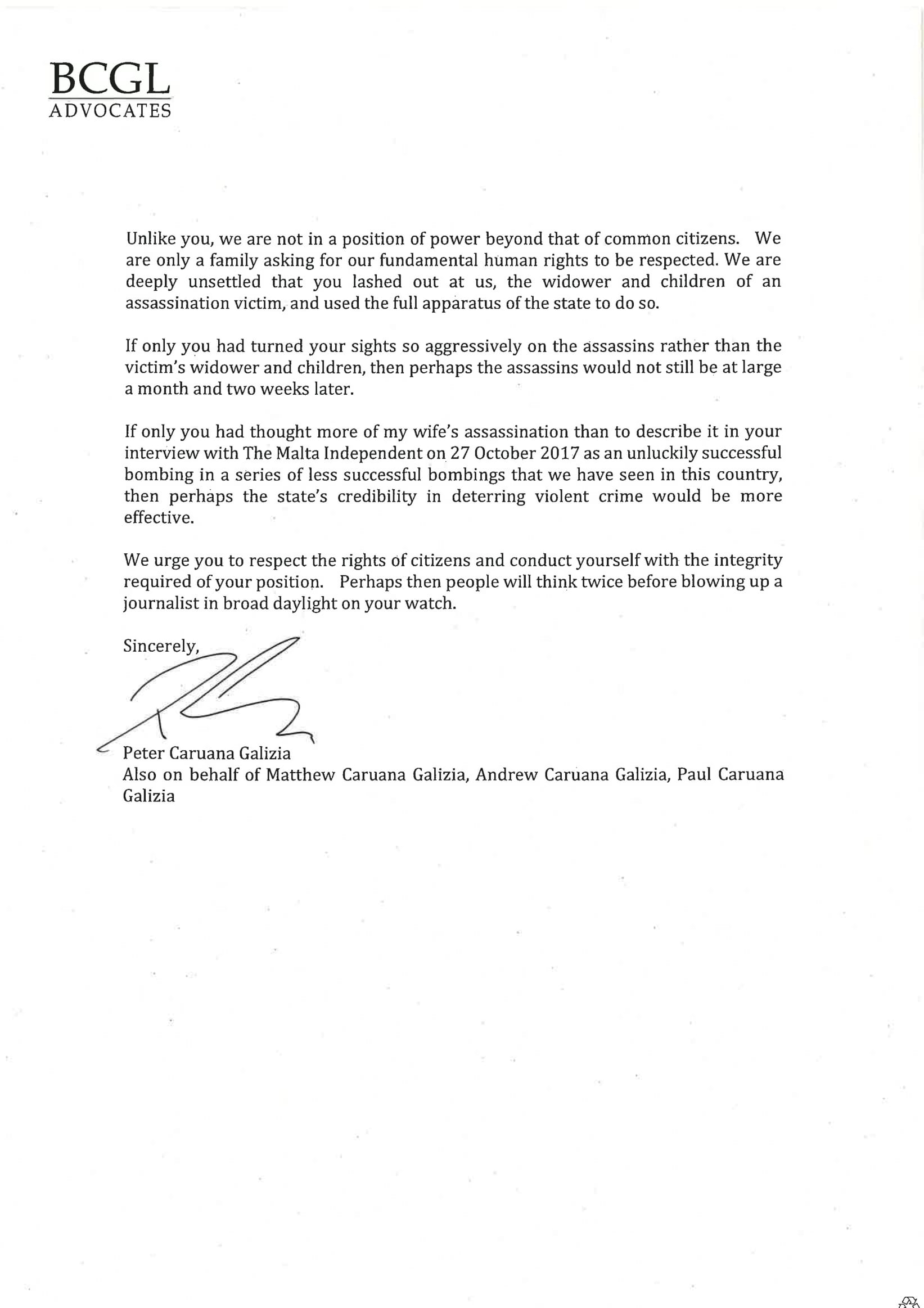 [/vc_column_text][/vc_column][/vc_row][vc_row][vc_column][vc_basic_grid post_type=”post” max_items=”4″ element_width=”6″ grid_id=”vc_gid:1512137999330-c98266d2-ed08-0″ taxonomies=”18782, 18781″][/vc_column][/vc_row]
[/vc_column_text][/vc_column][/vc_row][vc_row][vc_column][vc_basic_grid post_type=”post” max_items=”4″ element_width=”6″ grid_id=”vc_gid:1512137999330-c98266d2-ed08-0″ taxonomies=”18782, 18781″][/vc_column][/vc_row]
01 Dec 17 | Index in the Press
The Caruana Galizia family has expressed its dismay that what it said was a “private letter” sent to Home Minister Michael Farrugia was made public by the minister. Read the full article
30 Nov 17 | Asia and Pacific, Campaigns -- Featured, Maldives
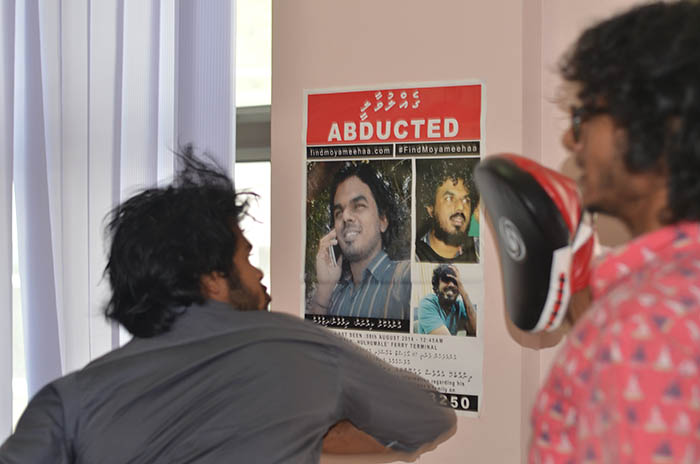
Staff at the Maldives Independent taking part in self-defence training.
“This award feels like a lifeline. Most of our challenges remain the same, but this recognition and the fellowship has renewed and strengthened our resolve to continue reporting, especially on the bleakest of days. Most importantly, we no longer feel so alone.”
– Zaheena Rasheed, former editor Maldives Independent, 2017 Journalism Fellow
Silence is the oppressor’s friend. Harassing those who speak out against corruption and injustice – like this year’s Freedom of Expression Awards Fellows Maldives Independent – is the favoured tool of those who seek to crush dissent. We cannot let the bullies win.
With your help, each year we are able to support writers, journalists and artists at the free speech front line – wherever they are in the world – through Index Fellowships. These remarkable individuals risk their freedom, their families and even their lives to speak out against injustice, censorship and threats to free expression.
I am writing now to ask you to support the Index Fellows. Your donation provides the support and recognition these outstanding individuals need to ensure their voices are heard despite the restrictions under which they are forced to live and work.
Your support will help award winners like Maldives Independent, which has continued to provide independent and critical journalism despite continued government pressure, threats of closure and the tragic murder of prominent liberal blogger and close friend of the Maldives Independent Yameen Rasheed in April, just a few days after the Freedom of Expression Awards 2017.
In spite of these challenges, Index has worked closely with Maldives Independent to help them to get on a better footing financially, to secure their office and staff, and to help them continue to hold power to account and expose wrongdoing and corruption in the country.
Reflecting on Index’s help, ex-editor Zaheena Rasheed said: “Sometimes you don’t realise how working in the kind of environment that we are working in and facing the kind of personal and professional challenges and losses that it, it can take a toll, and I think for me it [Index’s help] has been really helpful because I realise in many ways that I do need some help.”
I hope you will consider showing your support for free speech and the Index Fellows. A gift of £500 would support professional psychological assistance for a fellow; a gift of £100 helps them travel to speak at more public events. A gift of £50 helps us to be available for them around the clock. You can make your donation online now.
Please give what you can in the fight against censorship in 2018. Make your voice heard so that others can do the same.
Thank you for your support.
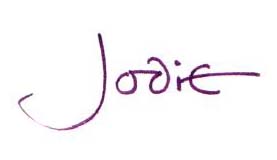
Jodie Ginsberg, CEO
P.S. The 2018 Index on Censorship awards will be held in April. To find out more about the awards including previous winners, please visit: https://www.indexoncensorship.org/newsite02may/fellowship
Index on Censorship is an international charity that promotes and defends the right to free expression. We publish the work of censored writers, journalists and artists, and monitor, and campaign against, censorship worldwide.
30 Nov 17 | Europe and Central Asia, Italy, Mapping Media Freedom, Media Freedom, media freedom featured, News and features
[vc_row][vc_column][vc_column_text]
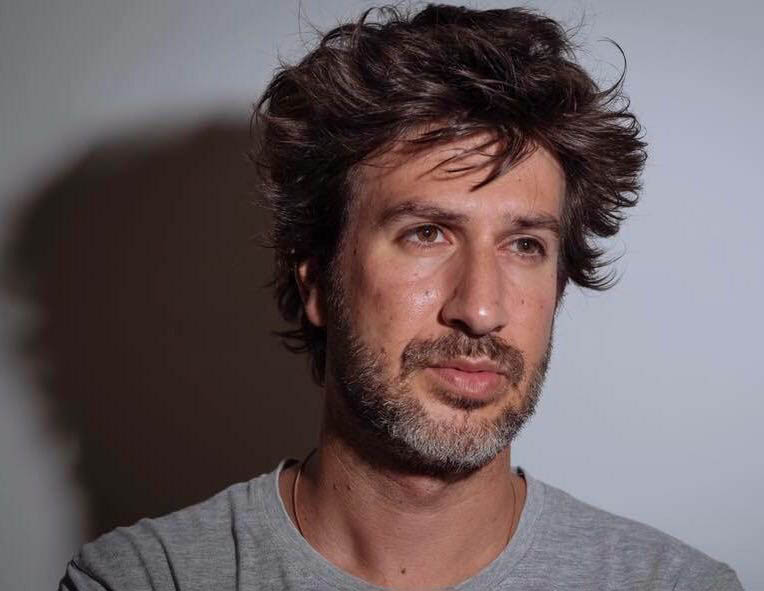
Italian journalist Lorenzo Tondo
On 10 November, like many days over the last two years, reporter Lorenzo Tondo was sitting in a courtroom in Palermo. A correspondent for The Guardian, he has been following closely the trial of an Eritrean man accused by Italian investigators of being at the helm of an international people-smuggling ring. Tondo was among the first to point out, through painstaking investigative work, that, in reality, the person standing in the dock might be a refugee, a victim in a case of mistaken identity.
So, when prosecutors announced new evidence had been filed during the latest hearing, Tondo was eager to get his hands on it. He rushed down to the records office, obtained a copy and started flicking through the hundreds of pages.
He was halfway through the documents when something odd caught his attention. His own name appeared: “Two conversations and a text between Haile Fishaye Tesfay and journalist Lorenzo Tondo, correspondent in Italy for the British newspaper The Gardian [sic] have been wiretapped,” the record states.
The investigators he had been covering for over a year, had listened to his private calls with a source and published the transcripts, in a violation of his professional rights.
“It was very hard to take in,” Tondo told Index on Censorship. “On one hand I suspected these sorts of things might be happening, knowing the environment in which I work. But I was shocked when I actually found out because I thought I had always acted in a transparent and responsible way.”
Tondo was particularly struck by how trivial the conversations published in the documents were. He was not commenting on or revealing information about any possible crime. Tesfay had been helping the reporter translate documents from Tigrinya, a language spoken in Eritrea, and they were now discussing his potential involvement in an upcoming documentary about the case. The transcript shows that, after Tesfay voiced his worries about being identified by people traffickers, Tondo assured his face would not be shown. This promise of anonymity was shattered by the investigators’ decision to release the wiretaps.
“They breached my rights,” Tondo said. “I abide by professional confidentiality and I need to defend my sources. I am not saying that journalist should be totally exempted from wiretapping if they are actually committing any crime. But if you realise the conversations are not relevant in the context of the investigation, I do not see any reason to publish them other than to discredit the person who, for over a year, has been pointing out your mistakes.”
Albeit disturbing, Tondo’s wiretapping is far from an isolated case of the Italian judiciary’s intrusion into the work of Italian reporters. Journalists have been secretly recorded on a number of recent occasions. Even more commonplace is the practice to serve media outlets or individual reporters with orders to hand over evidence and journalistic material. Just a few days after Tondo’s case emerged, officers from Guardia di Finanza, Italy’s financial police, raided the newsrooms of Il Sole 24 Ore and La Verita, two national dailies, and seized the digital archives of journalists Nicola Borzi and Francesco Bonazzi respectively. The two had just published articles, based on leaked information, detailing the links between Italy’s spying agencies and Banco Popolare di Vicenza, a bank currently in liquidation.
Although some newspapers have expressed concern and the journalists’ association denounced the violations, these episodes have largely gone unnoticed by mainstream public debate.
For Tondo, bugging a reporter or seizing their information has become so commonplace that it is not news anymore. “As wiretapping is such standard practice in Italian investigations, there are many precedents [of journalists being recorded]. So it is no longer that surprising. Italians have become dangerously inured to this, while abroad there is much more outrage.”
As Tondo pointed out, wiretapping forms an integral part of most investigations in Italy. In indictments, the bulk of the evidence is extremely likely to be drawn from secretly recorded conversations. Their wholesale use dates back to the bloody mafia wars of the early 1990s, when the Sicilian crime syndicate, Cosa Nostra, routinely killed prosecutors, judges and politicians, threatening the very foundations of the national democratic state.
In the fightback that followed, investigators have been granted wide-ranging powers. A strategy that has been successful in curbing the power of mafias, but which may have worrying side effects.
“There is a fundamental difference between the use of these tools and their abuse,” Tondo said. “In Italy many prosecutors are overusing them.”
In his case, Tondo argues that by publishing a transcript of his wiretapped conversations prosecutors might not only have violated his professional rights but also potentially broken a law.
Article 271 of the Italian criminal code forbids the use of wiretapped conversations of a range of professionals, including journalists, when they would reveal confidential information obtained because of their role.
“Even if there is no legal implication for myself, I believe it is my duty to defend my rights,” Tondo added. “This is a fair battle to fight because at stake is not only my work but, more importantly, that of many other reporters like us.”
After taking legal advice, Tondo is now evaluating the best course of action to protect himself from further intrusions. In the meantime, his work to lay bare what he believes to be an egregious miscarriage of justice continues. Despite the working situation in Palermo is becoming increasingly tough for him. Criticising the local prosecutors’ office cut his access to a steady flow of information and made many colleagues, relying on investigators for their exclusives, turn their backs on him.
“This case made me understand how visceral the relationship between journalists and the judiciary in Palermo is,” Tondo said. “Many reporters here have become press officers for the prosecutors. They have lost their independence, their impartiality. This closeness becomes a problem when that same authority makes a mistake. And if you try and leave this ‘private circle’ you become marginalised.”
[/vc_column_text][/vc_column][/vc_row][vc_row][vc_column][vc_basic_grid post_type=”post” max_items=”4″ element_width=”6″ grid_id=”vc_gid:1512050345577-4d6f8ba3-9c7a-2″ taxonomies=”193″][/vc_column][/vc_row]
30 Nov 17 | Campaigns -- Featured
Dear President Juncker,
Dear President Tajani,
Dear Prime Minister Ratas,
Dear Prime Minister Borissov,
Dear Ministers,
Dear MEP Voss,
We write to you to share our respectful but serious concerns that discussions in the Council and European Commission on the Copyright Directive are on the verge of causing irreparable damage to our fundamental rights and freedoms, our economy and competitiveness, our education and research, our innovation and competition, our creativity and our culture.
We refer you to the numerous letters and analyses sent previously from a broad spectrum of European stakeholders and experts for more details (see attached).
On behalf of the signatories,
Caroline De Coc
The over 80 signatories below represent human and digital rights organisations, media freedom organisations, publishers, journalists, libraries, scientific and research institutions, educational institutions including universities, creator representatives, consumers, software developers, start-ups, technology businesses and Internet service providers.
1 Access Info Europe – Europe
2 ActiveWatch – Romania
3 Allied for Startups – Europe
4 ARTICLE 19 – Global
5 Asociación de Internautas – Spain
6 Asociación Española de Startups – Spain
7 Associação D3 – Defesa dos Direitos Digitais (D³) – Portugal
8 Associação Nacional para o Software Livre (ANSOL) – Portugal
9 Association for Progressive Communications (APC) – Global
10 Association for Technology and Internet (ApTI) – Romania
11 Association of European Research Libraries (LIBER) – Europe
12 Association of Publishers of Periodical Publications (AEEPP) – Spain
13 Association of the Defence of Human Rights in Romania (APADOR-CH) – Romania
14 Association of the Internet Industry (eco) – Germany
15 Austrian Startups – Austria
16 Bits of Freedom (BoF) – Netherlands
17 BlueLink Civic Action Network – Bulgaria
18 Brand24 – Poland
19 Bulgarian Helsinki Committee – Bulgaria
20 Center for Democracy & Technology (CDT) – Global
21 Centrum Cyfrowe – Poland
22 Civil Liberties Union for Europe (Liberties) – Europe
23 Communia Association – Global
24 Computer and Communications Industry Association (CCIA) – Global
25 Copyright for Creativity (C4C) – Europe
26 Create Refresh Campaign – Europe
27 Creative Commons – Global
28 DIGITALEUROPE – Europe
29 Dutch Association of Public Libraries (VOB) – Netherlands
30 EDiMA – Europe
31 Electronic Frontier Foundation (EFF) – Global
32 epicenter.works – Austria
33 Estonian Association of Information Technology and Telecommunications (ITL) – Estonia
34 Estonian Startup Leaders Club – Estonia
35 European Bureau of Library, Information & Documentation Associations (EBLIDA) – Europe
36 European Digital Rights (EDRi) – Europe
37 European Innovative Media Publishers – Europe
38 European Internet Services Providers Association (EuroISPA) – Europe
39 European University Association (EUA) – Europe
40 Factory Berlin – Europe
41 Federation of Hellenic Information Technology & Communications Enterprises (SEPE) – Greece
42 France Digitale – France
43 Free Knowledge Advocacy Group EU (FKAGEU) – Europe
44 Free Software Foundation Europe (FSFE) – Europe
45 Frënn vun der Ënn – Luxemburg
46 German Library Association (dbv) – Germany
47 Hermes Center for Transparency and Digital Human Rights – Italy
48 Human Rights Without Frontiers (HRWF) – Global
49 Hungarian Civil Liberties Union (HCLU) – Hungary
50 Index on Censorship – Global
51 Initiative gegen ein Leistungsschutzrecht (IGEL) – Germany
52 International Federation of Library Associations and Institutions (IFLA) – Global
53 ISPA Austria – Austria
54 Italian Coalition for Civil Liberties and Rights (CILD) – Italy
55 Italian Internet Service Providers Association (AIIP) – Italy
56 Justice & Peace – Netherlands
57 Kennisland – Netherlands
58 l’Association des Services Internet Communautaires (ASIC) – France
59 League of European Research Universities (LERU) – Europe
60 Libraries and Archives Copyright Alliance (LACA) – UK
61 Media Development Center – Bulgaria
62 Mind the Bridge – Global
63 Modern Poland Foundation – Poland
64 National Online Printing Association (ANSO) – Italy
65 Netherlands Helsinki Committee (NHC) – Netherlands
66 Open Knowledge International (OKI) – Global
67 Open Rights Group (ORG) – UK
68 OpenMedia – Global
69 Platform for the Defence of Free Expression (PDLI) – Spain
70 Portuguese Association for Free Education (AEL) – Portugal
71 Public Libraries 2020 – Europe
72 Robotex – Estonia
73 Roma Startup – Italy
74 SA&S – Partnership for Copyright & Society – Belgium
75 Science Europe – Europe
76 SentiOne – Poland
77 Silicon Allee – Germany
78 SPARC Europe – Europe
79 Startup Poland – Poland
80 Ubermetrics – Germany
81 Wikimedia Deutschland – Germany
82 Xnet – Spain
83 ZIPSEE – Poland
84 Technology Ireland – Ireland
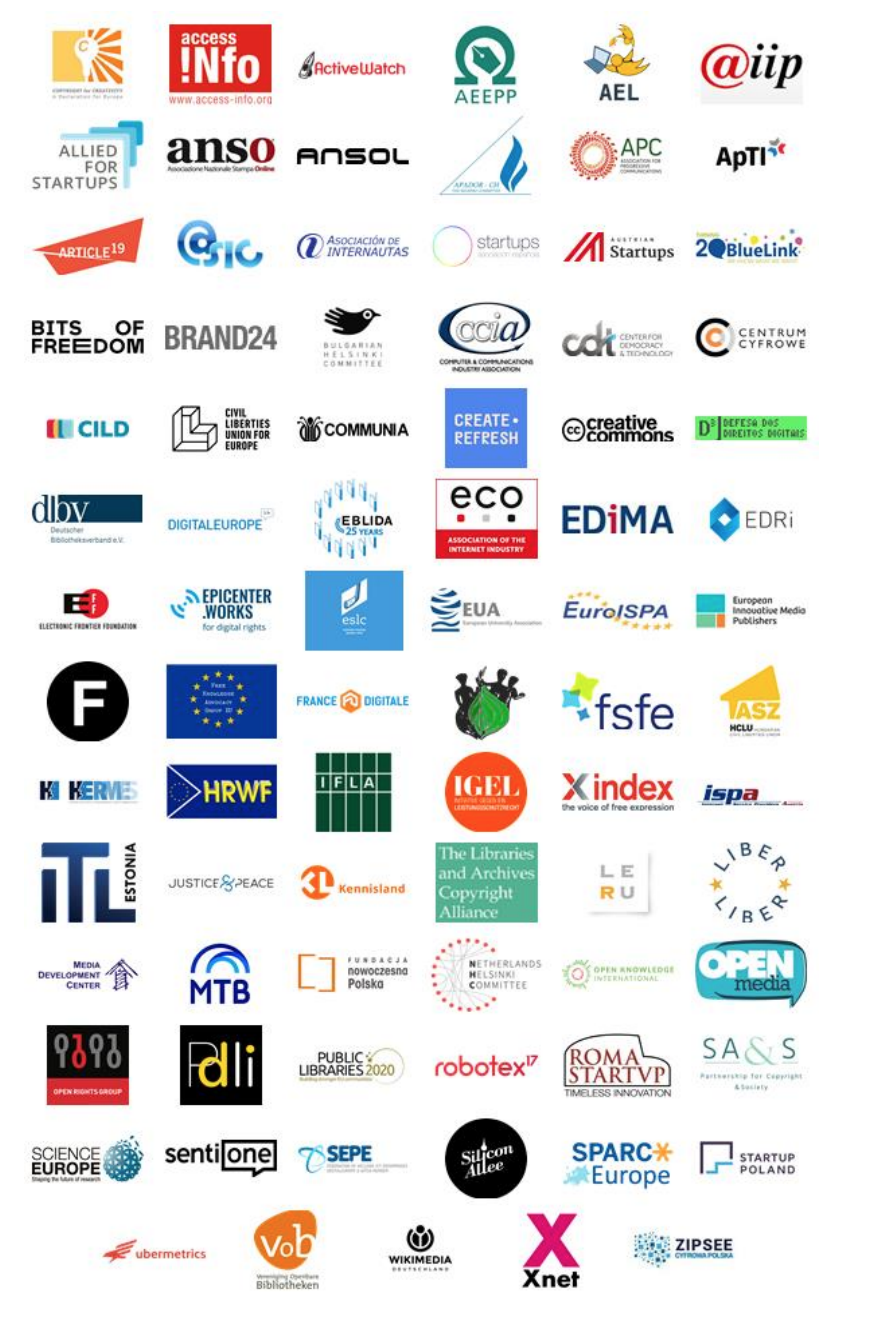
30 Nov 17 | Index in the Press
From Poland and Hungary to parts of Africa and South America, states are using commercial ruses to squeeze out liberal media Read the full article
29 Nov 17 | News and features
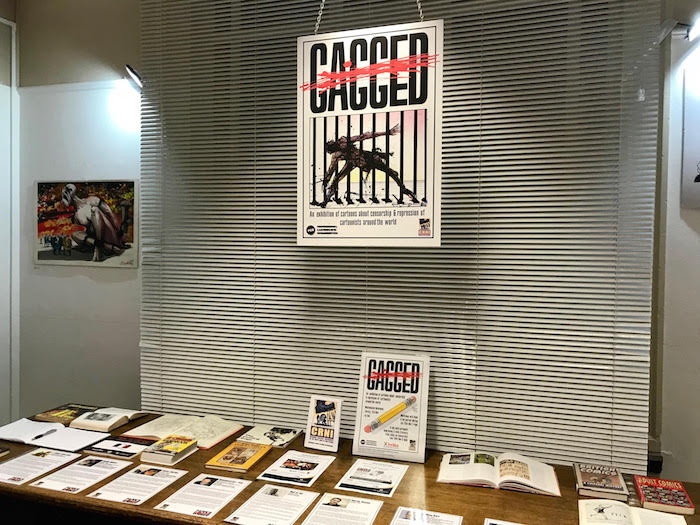
Stall at the Gagged exhibition, showcasing political cartoonists’ work
“This is a key to realms of wonder, but it’s also a deadly weapon, a weapon of mass distraction,” UK cartoonist Martin Rowson said, describing a pen, as he opened a discussion about censorship and repression of political cartoonists.
The event had planned a video link-up with Zulkiflee Anwar Haque, the Malaysian cartoonist better known as Zunar, but he was unable to attend. There have been reports of his arrest. Zunar uses his art to take a stand against corruption in Malaysian politics. The cartoonist is facing 10 sedition charges which are still pending trial. On these charges, Zunar faces 43 years in prison.
In his absence, a video of the cartoonist was shown in which he states, “you can ban my books, you can ban my cartoons, but you cannot ban my mind”.
The Westminster Reference Library hosted a discussion on 28 November, during an exhibition of political cartoons: Gagged. Speakers included Index on Censorship’s Jodie Ginsberg, UK cartoonist Martin Rowson, Sudanese cartoonist Khalid Albaih, and Cartoonist Rights Network International’s Robert Russell.
Cartoonist Rowson and Albaih, currently based in Copenhagen, expressed the responsibility they feel working from a safe environment. They acknowledged the oppression of their colleagues and cited them as inspiration for the cartoons they continue to publish.
“I feel so guilty that I’m here doing this but at the same time, I have a lot of friends who are in jail, who were arrested, and who are really fighting that fight to say what they want to say … It’s something that hurts me everyday”, Albaih said. “Everyday that I’m walking down Copenhagen. It’s a beautiful city but I can’t enjoy it because most of my friends can’t even get a visa to go to the country next to them … People like Zunar, they’re incredible and they’re powerful and I look up to them. And I hope one day I can go back to my country and be able to do that without being scared that something will happen to my kids, you know?”
Ginsberg spoke on the importance of freedom of expression in the face of adversity and the reality of censorship in countries that believe they have “free speech”. “Censorship isn’t something that happens ‘over there’. It happens here and it happens on our doorstep.”
“I genuinely believe that the pen is mightier than the sword, but I also think … that many pens and many voices are even better. Oppressors win when they think their opponents are alone,” Ginsberg said. “We succeed when we demonstrate that it’s not the case.”
**The exhibition has now been extended to 7 December.



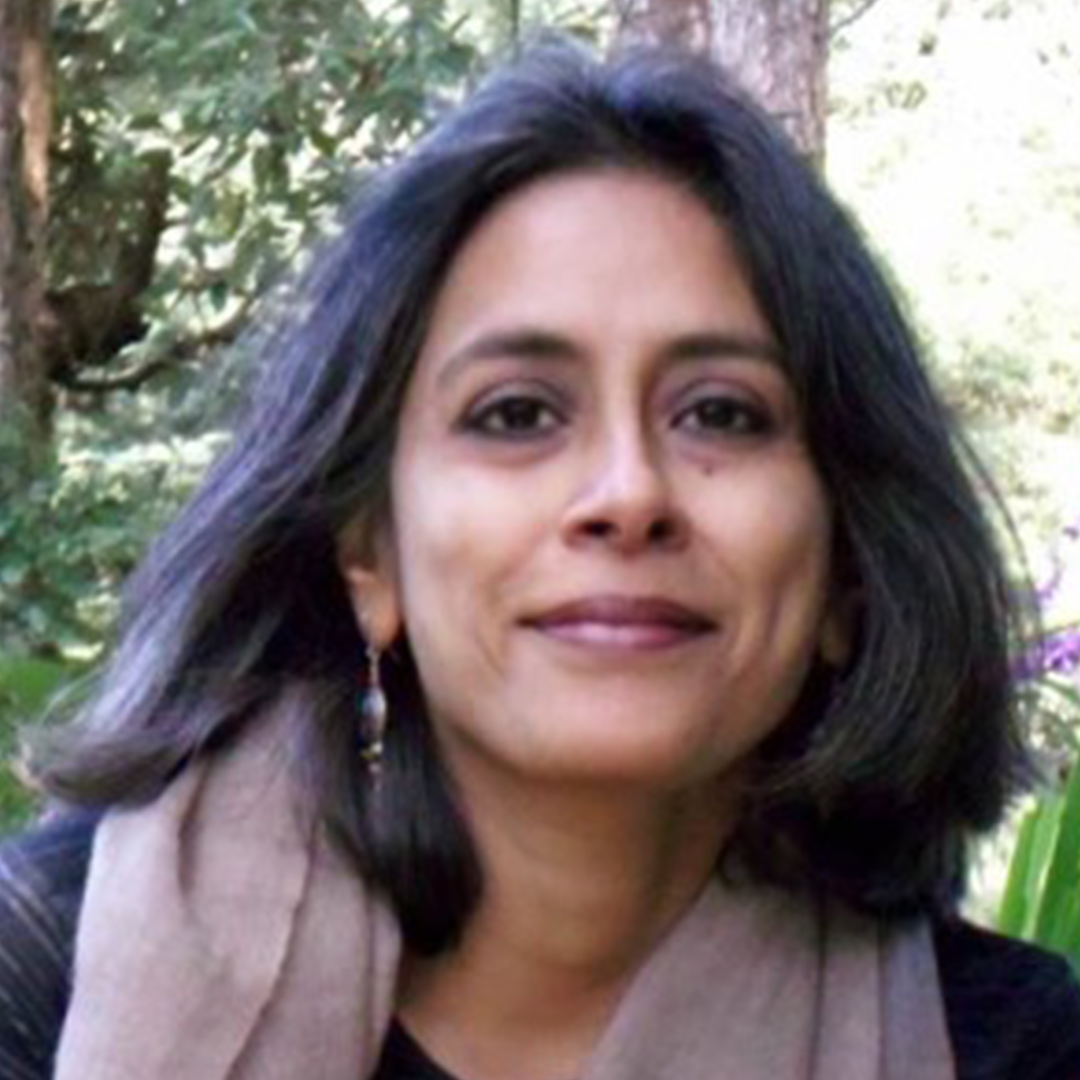
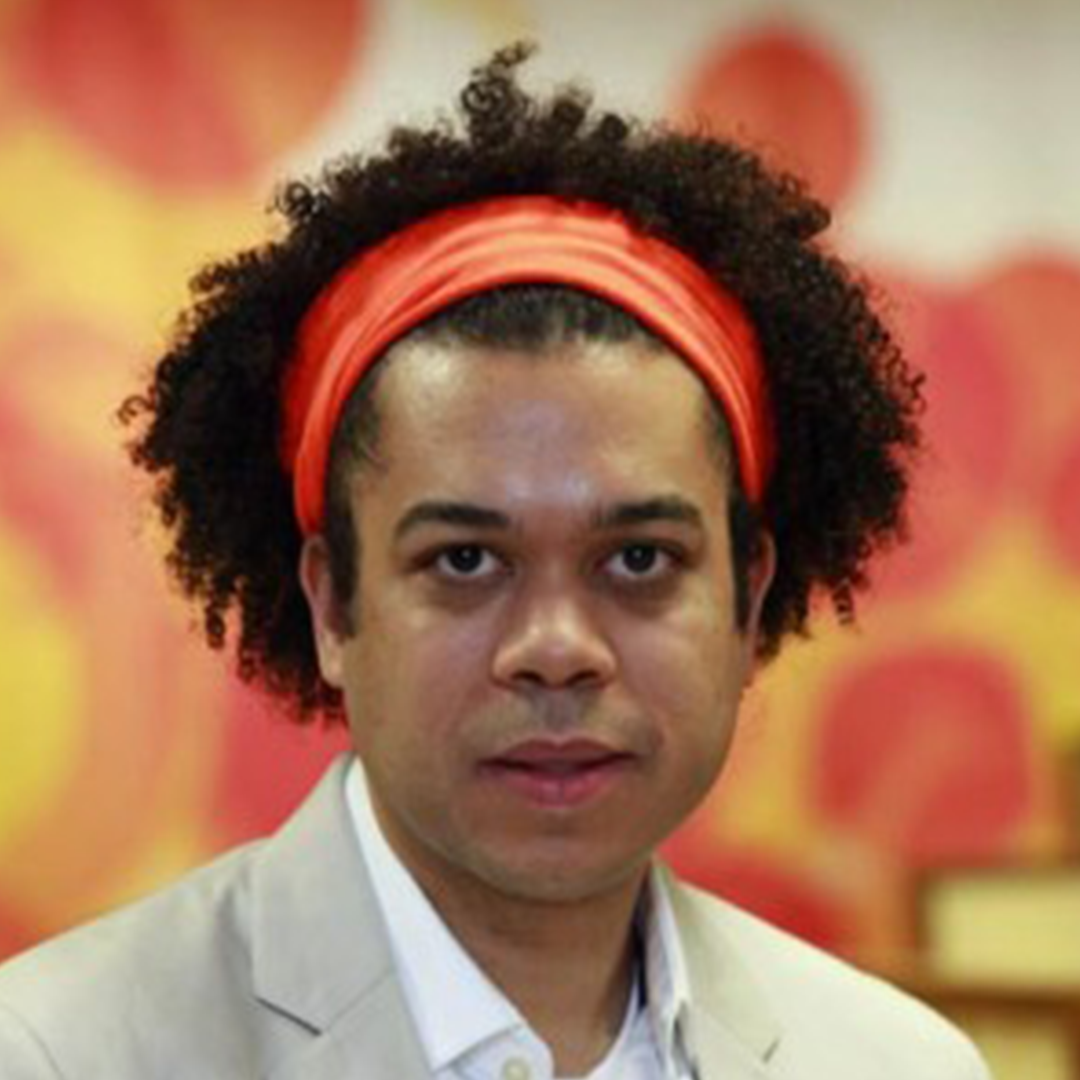




 [/vc_column_text][/vc_column][/vc_row][vc_row][vc_column][vc_basic_grid post_type=”post” max_items=”4″ element_width=”6″ grid_id=”vc_gid:1512137999330-c98266d2-ed08-0″ taxonomies=”18782, 18781″][/vc_column][/vc_row]
[/vc_column_text][/vc_column][/vc_row][vc_row][vc_column][vc_basic_grid post_type=”post” max_items=”4″ element_width=”6″ grid_id=”vc_gid:1512137999330-c98266d2-ed08-0″ taxonomies=”18782, 18781″][/vc_column][/vc_row]



